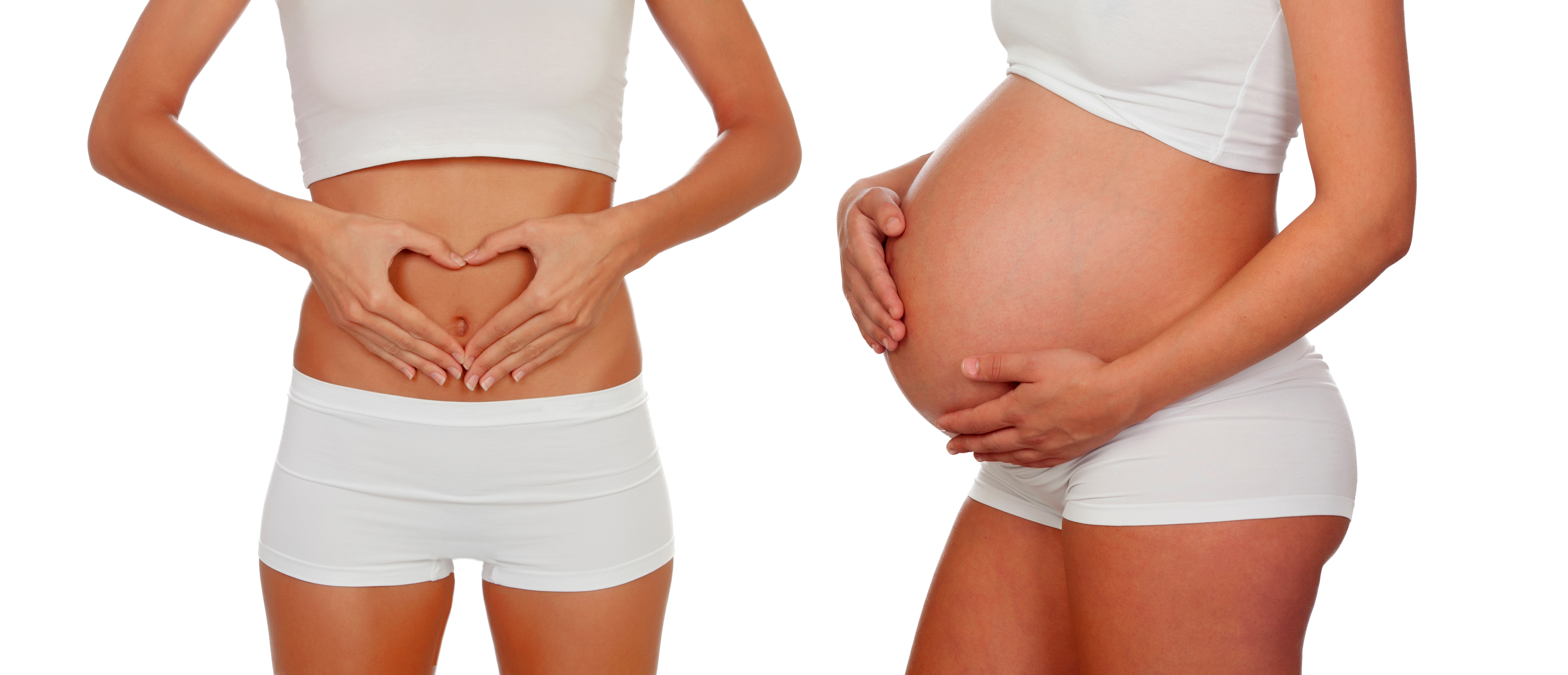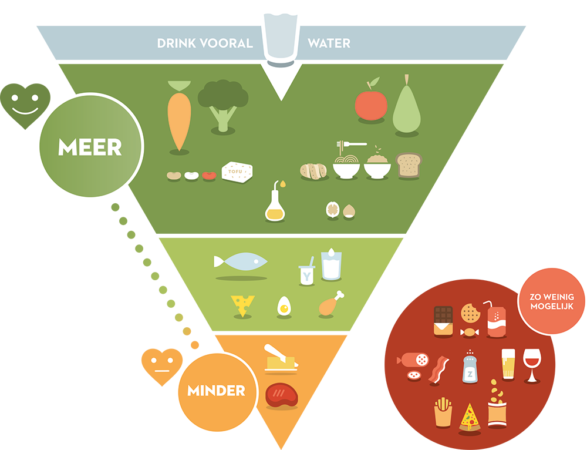
Diet during your pregnancy
A healthy lifestyle and a balanced and varied diet, sufficient physical exercise and not smoking during pregnancy is important for both your baby and yourself. It is also recommended to pay attention to a number of specific foods and food safety.
To achieve the recommended intake of certain nutrients, we recommend taking certain dietary supplements during your pregnancy. A healthy lifestyle also helps to achieve the recommended weight gain while pregnant and will reduce the risk of pregnancy complaints.
Eating well does not mean that you need to eat for two, but it does mean that you must twice as well. In other words: the quality of the food is more important than the quantity.
Food pyramid
Food pyramidThe food pyramid is based on three principles:
- Balanced diet: for a balanced diet, you have to eat an item from each food group every day. In doing so, you have to take account of the size of the shelves: the bigger the shelf that contains the food item, the more you need to eat of it.
- Variation: it is important to vary food stuffs within the same food group. It is for instance not recommended to only choose apples from the fruit group.
- Moderation: respect the recommended amounts in the different groups. In the case of meat for example, 100 mg per day is enough.

Eight groups of food stuffs
The food pyramid divides food stuffs into eight groups on the basis of the nutrients it provides. Food stuffs (e.g. cheese and milk) that provide mostly the same nutrients (e.g. protein, calcium) fall into the same group. Each food stuff provides a range of nutrients, but no single food stuff ever provides all the necessary nutrients.
- Fluids are essential to our body. They do more than quenching thirst: they are a means of transport for delivering nutrients and removing waste. Daily requirement: 2.5 litres of fluid, 1 litre of which is derived from solid food stuffs and 1.5 litres in the form of beverages (water, light herbal tea, etc.) Water is and always will be the best thirst quencher.
- Grain products such as bread, rusks, crispbread, breakfast cereals, rice, pasta and potatoes. Grain products and potatoes provide carbohydrates, plant proteins, vitamins, minerals and fibre.
- Vegetables contain carbohydrates, vitamins, minerals and fibre. Not all vegetables contain the same vitamins and minerals, so make sure you vary them. Vegetables contain other nutrients than fruit, so eat from both groups every day. Green vegetables are a good source of iron.
- Fruit provides carbohydrates, fibre, vitamins and minerals. Vegetables contain other nutrients than fruit, so eat from both groups every day. Eat fresh fruit in place of tinned or dried fruit.
- Dairy products and calcium-enriched soy products provide animal protein, calcium and vitamin B. Calcium helps build and maintain strong bones.
- Meat, fish, eggs or substitute products provide protein, iron and vitamins. Animal products also deliver fat and cholesterol.
- Margarine, minarine, butter, oil, etc. provide fat, fat-soluble vitamins A and D and essential fatty acids. Limit the use of fats in cooking or on bread.
- Remainder: Sweets, sugar-rich drinks, mayonnaise, etc. These products provide a lot of energy but little fibre and few vitamins and minerals. Use them in moderation. Too much sugar, sweets, biscuits and soft drinks dampens your appetite for nutritious food stuffs. It will result in unbalanced dietary habits that mean that you will no longer get the necessary nutrients.

The exercise shelf
The exercise shelfThe exercise shelf in the active food pyramid is there to stress the importance of sufficient daily exercise.
Recommended food supplements
Recommended food supplementsIf you eat a healthy diet, you get all the necessary nutrients you and your baby need in adequate amounts. Sometimes, insufficient amounts of nutrients are absorbed by eating too little or with too little variation. Nutrient reserves may be used when following a weight loss diet or in case of morning sickness. In that case, taking a multivitamin preparation is often recommended.
Because some vitamins can be harmful for the foetus if taken in large quantities, this must be done with the utmost care. For that reason, the use of multivitamin preparations that have been designed especially for pregnant women is preferred.
It is strongly recommended to take 0.4 mg folic acid a day from the day that you stop using contraception until the end of the first three months of the pregnancy. This is an essential step to protect the baby against congenital anomalies of the brain and spinal cord.
Iron requirements are covered by a sufficiently regular and varied diet. If you have an iron deficiency at the beginning of a pregnancy, an iron supplement is necessary because iron reserves in the body are only very slowly replenished through diet. Severe iron deficiency can lead to anaemia, which in turn can result in a lack of oxygen for the foetus. This can disturb normal growth and development. Severe anaemia is rare in Belgium.
Omega 3 fatty acids are also called ‘fish fats’ because fatty fish is rich in these fatty acids. The body cannot produce these fatty acids itself; therefore, they all need to be absorbed from food. They have a positive effect on the inflammation response, cardiovascular disease, diabetes, and they may also prevent premature births. An average intake of 200 mg DHA/day is recommended during pregnancy and breastfeeding. However, to reach 200 mg DHA/day you should not necessarily take a supplement. You can also achieve this amount by eating fish once to twice a week. Vary between fatty and lean fish. The benefit of taking omega 3 fatty acid supplements during pregnancy has not been sufficiently demonstrated yet.
Being careful with certain types of food
Being careful with certain types of foodWe take blood samples at the beginning of your pregnancy. One of the tests we run is to check whether or not you are immune to certain infections that can be transmitted by food stuffs. If you are not immune, you must stay away from these food while pregnant.
More information about foods to avoid and about the infections can be found here:
Something wrong or unclear on this page? Report it.



